





I don’t remember when I first learned of the death of my grandfather Robert Harrington at the hands of Birmingham, Alabama, police in 1929. The subject came up often in our family, and my mother carried the heartbreak of the event viscerally, even though she had been just a little girl when it happened.

What I knew of his killing, and his life, was offered in snippets of facts, anecdotes, fading memories, and speculation—“he liked to dress nice and had a good job,” “he drew attention to himself because your grandmother could pass for white,” “you couldn’t look sideways at the police in those days without getting yourself killed.”
All the missing pieces are why I never tried to write the story—even though I thought it might give my mother some sense of peace. I couldn’t muster the facts or the emotional energy. That is, not until the murder of George Floyd. That’s when I vowed to tell my grandfather’s story.
I called my mother—she was ninety-two at the time. I jotted notes as she reminded me that my brother is named after our grandfather, repeated for the thousandth time that Grandpa was considered a boastful man, and spoke of Grandma’s escape from danger after her husband was killed. I opened my box of family photos and stared at the only photograph we have of my grandfather—one taken on his wedding day. That photo became my constant companion as I began to imagine the details and circumstances of my family’s tragedy that would eventually become this novel. Time’s Undoing—told in two interweaving narratives—is the culmination of that effort.
In 1929 we find Robert, not yet thirty, living in bustling Birmingham with his teenaged wife and baby daughter. He is a master carpenter who takes pleasure in his skills, his beautiful spouse, and his expensive car. His pride soon gains the attention of a corrupt and racist police detective, which leads to a doomed chase of cat and mouse.
In 2019 we meet Meghan McKenzie, Robert’s great-granddaughter, a journalist covering the Black Lives Matter movement for the Detroit Free Press. Exasperated by the scores of police shootings she’s covered, Meghan seeks out an assignment to investigate Robert’s nine-decades-old homicide in order to show a historical pattern of systemic racism in law enforcement in America.

As I developed the plot for Time’s Undoing, I searched the public records of various Alabama databases, delved through newspaper archives, studied the laws of the Jim Crow South, and made many inquiries—I still, to this day, don’t know where (or if) my grandfather was buried. However, I did uncover two documents my family never had: a 1929 newspaper account of my grandfather’s shooting and, with that information in hand, his official death certificate.

I remember the mixed feelings of heartbreak and joy I had when I found the newspaper report, marveling at how my real-life activity mirrored those of my fictional protagonist, Meghan. For a moment it felt like I was inside my own novel.
I called my mother to tell her of my discovery.
“Mom, I found it. A report in the St. Pete Times about Grandpa’s death. Your story is true. There’s proof.”
“Praise God,” she responded.
I do believe I had more than a little divine guidance in writing this novel. My grandfather, pointing his finger across time, often showed me the way. Thank you, Grandpa!
Ultimately, Time’s Undoing is a work of fiction. But, dear reader, you will also find this is a story centered in the truth about the power and resilience of community, family, and hope.
Robert Harrington

from Time’s Undoing, a searing new novel about a Black journalist investigating the unsolved murder of her great-grandfather decades ago


1. The opening scene between Cress and the detective starts the book out on an actionpacked note. What did you think when you first read it? How does it set up the book?
2. We first meet Meghan at a funeral—her “fifth funeral in six months”—then in conversation with her grandmother, then in her editorial meeting at her newspaper. What do these three scenes tell the reader about Meghan’s character?
3. In chapter one, Robert says, “All my life I’ve tried to make up for my dark complexion.” How does colorism come up throughout this book?

4. The motto of the newspaper Awaken is “Progress doesn’t happen while you sleep,” which reminds Meghan of the Black Lives Matter movement’s phrase “stay woke.” How does this book compare and contrast the movements of the past and present?
5. From Airbnb and Uber Eats to the Black Lives Matter movement, we see distinct differences between Meghan’s 2019 world and Robert’s life in 1929. How does the contrast develop over the course of the book? How do their resources change their circumstances?
6. Anna Kate does not adjust to Birmingham quickly. Have you ever struggled with a move? What did you think of her character?
7. Today, most people are used to having Google at their fingertips, but Meghan has to rely on collections of old newspapers, with only some available to access in digital collections. What is at stake for journalism
and research when there is limited or obstructed access to information and archives? In the modern era, is there a risk to having unlimited information access?
8. Robert takes a lot of pride in his Franklin. What does the car symbolize to his character and to the story?
9. Birmingham is a city with a dark history. “Birmingham wants to protect its reputation. I believe in the new South, but not every city can easily catch up to the future, and every place has to reckon with its past. No matter how much things change, secrets will bubble up through the ground. One of my jazz pals always used to say, ‘the earth holds all the dirt.’ ” How does the modern citizen’s desire to either explore or hide that history manifest in this story?
10. Even in the Jim Crow South, the Black population found ways to build robust and meaningful lives. What were the institutions and traditions that allowed Robert and Anna Kate to have endurance, creativity, and faith in the face of segregation and race hatred?
11. Throughout Meghan’s investigation she relies on oral histories. Starting with her grandmother’s much-repeated tale of her father’s death to the stories shared by Cecile Clarke, the motel owner, and Roberta Banton, the relative of the Black newspaper publisher. Do oral histories have value in understanding America’s past?
A letter from Anna Kate to Robert while he is living alone at the boarding-house, as seen on the opening pages of TIME’S UNDOING:
June 3, 1929
Dear Robert:
Forgive my late reply. Things here have taken an ugly turn, and I couldn’t take the chance that a letter might be used to find you. The police now know you were the man involved in the altercation downtown. The man you hit suffered no major bodily harm but his pride was badly injured, and apparently he is a man with some influence.

Policemen came to your mother’s house demanding to know your whereabouts. Thank God, Mae and I weren’t home at the time. The neighbors say three officers, screaming and waving guns, forced your mother out to her porch while they searched the house. They knocked down doors and turned over furniture. They threatened your mother. She was so shaken she took to her bed for a few days. She is fine now and we are watching out for her. But at Mama’s urging I’ve moved home to have the protection of my family. We are all okay and I don’t want you to worry. Mae is doing fine. Growing so fast. She has two cousins here to play with and passes her days in good spirits. At night she calls to you in her dreams and giggles. She misses you. So do I.

I’m finally starting to show. Mama thinks the baby is a boy because I’m carrying it low in my belly. It certainly kicks like a boy. But I believe we’re having another girl. Thank you for the money you sent. As you instructed, I shared some with your mother and I was able to buy Mae a pair of shoes she can grow into. I’m glad to hear your work is going so well. Birmingham sounds like an exciting city, and it suits you. I’m staying busy, too, helping with the laundry, cooking, and knitting for the new baby. Mama seems glad to have me around. Robert, I hope you are being cautious and avoiding any situations that will bring notice of you to the police, or the Klan. The old folks here say the Alabama Klan is the most dangerous in the South. Both of our mothers fear for your safety, and I pray for you every morning and evening. I will write to you more often now that things have settled down a bit. I pray we won’t be separated much longer. Please promise me we’ll all be together when the new baby comes.

With affection I remain your faithful wife,
Anna Kate